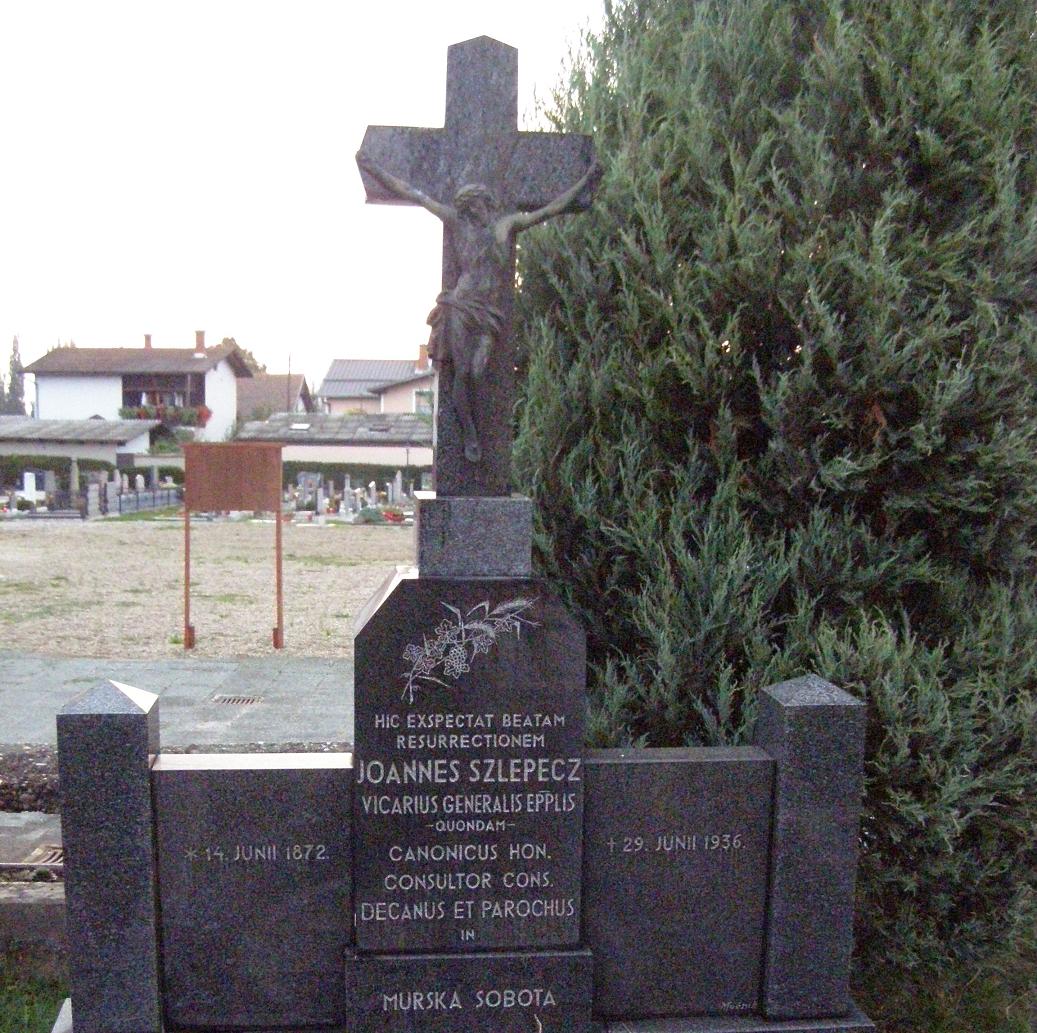János Szlepecz on:
[Wikipedia]
[Google]
[Amazon]

 János Szlepecz ( sl, Janoš Slepec or ''Ivan Slepec'', June 14, 1872 – June 29, 1936) was a Slovene
János Szlepecz ( sl, Janoš Slepec or ''Ivan Slepec'', June 14, 1872 – June 29, 1936) was a Slovene

Roman Catholic
Roman or Romans most often refers to:
*Rome, the capital city of Italy
*Ancient Rome, Roman civilization from 8th century BC to 5th century AD
*Roman people, the people of ancient Rome
*'' Epistle to the Romans'', shortened to ''Romans'', a lette ...
priest, dean, and writer. He wrote in the Prekmurje Slovene
Prekmurje Slovene, also known as the Prekmurje dialect, East Slovene, or Wendish ( sl, prekmurščina, prekmursko narečje, hu, vend nyelv, muravidéki nyelv, Prekmurje dialect: ''prekmürski jezik, prekmürščina, prekmörščina, prekmör ...
dialect and also in Hungarian.
He was born in Murska Sobota
Murska Sobota (, Slovenian abbreviation: ''MS'' ; german: Olsnitz;''Radkersburg und Luttenberg'' (map, 1:75,000). 1894. Vienna: K.u.k. Militärgeographisches Institut. hu, Muraszombat) is a town in northeastern Slovenia. It is the centre of the ...
in Vas County of the Kingdom of Hungary
The Kingdom of Hungary was a monarchy in Central Europe that existed for nearly a millennium, from the Middle Ages into the 20th century. The Principality of Hungary emerged as a Christian kingdom upon the coronation of the first king Stephen ...
(present-day Slovenia
Slovenia ( ; sl, Slovenija ), officially the Republic of Slovenia (Slovene: , abbr.: ''RS''), is a country in Central Europe. It is bordered by Italy to the west, Austria to the north, Hungary to the northeast, Croatia to the southeast, an ...
), where his father Iván Szlepecz was a blacksmith in the market town. His mother was Julianna Czigány. Starting in 1896, he served as chaplain for ten years for the Szapáry family, and then in 1906 as the parish priest of Murska Sobota. In 1913, after the death of Ferenc Ivanóczy
Ferenc () is a given name of Hungarian origin. It is a cognate of Francis, Francisco, Francesco, François, Frank and Franz. People with the name include:
* Ferenc Batthyány, Hungarian magnate and general
* Ferenc Berényi, Hungarian artist
* ...
, he became dean of the Slovene March.
Szlepecz initially opposed the autonomy of the Slovene March (Prekmurje
Prekmurje (; dialectically: ''Prèkmürsko'' or ''Prèkmüre''; hu, Muravidék) is a geographically, linguistically, culturally and ethnically defined region of Slovenia, settled by Slovenes and a Hungarian minority, lying between the Mur Ri ...
) and supported Hungary
Hungary ( hu, Magyarország ) is a landlocked country in Central Europe. Spanning of the Carpathian Basin, it is bordered by Slovakia to the north, Ukraine to the northeast, Romania to the east and southeast, Serbia to the south, Croatia a ...
. He later shifted his position and supported the Prekmurje Slovenes
The Prekmurje Slovenes ( sl, Prekmurci,''Prekmürci, Prekmörci, Prekmörge'') are Slovenes from Prekmurje in Slovenia and Vendvidék and Somogy in Hungary. The Prekmurje Slovenes speak the Prekmurje Slovene dialect and have a common culture. T ...
. After World War I
World War I (28 July 1914 11 November 1918), often abbreviated as WWI, was one of the deadliest global conflicts in history. Belligerents included much of Europe, the Russian Empire, the United States, and the Ottoman Empire, with fightin ...
, he maintained the liturgy in Prekmurje Slovene in St. Nicholas's Church. After the occupation of the Republic of Prekmurje
The Republic of Prekmurje ( hu, Vendvidéki Köztársaság, Mura Köztársaság; sl, Murska Republika, Republika Prekmurje; Prekmurje Slovene: ''Reszpublika Szlovenszka okroglina'', ''Mörszka Reszpublika'') was an unrecognized state in Prek ...
, Szlepecz was taken hostage by the Hungarian communists
Communism (from Latin la, communis, lit=common, universal, label=none) is a far-left sociopolitical, philosophical, and economic ideology and current within the socialist movement whose goal is the establishment of a communist society, a so ...
.
In 1918, Szlepecz was the bishopric vicar in Szombathely
Szombathely (; german: Steinamanger, ; see also other alternative names) is the 10th largest city in Hungary. It is the administrative centre of Vas county in the west of the country, located near the border with Austria. Szombathely lies by t ...
and in 1922 the honorary vicar in Maribor
Maribor ( , , , ; also known by other #Name, historical names) is the second-largest city in Slovenia and the largest city of the traditional region of Styria (Slovenia), Lower Styria. It is also the seat of the City Municipality of Maribor, th ...
. Before the First World War, he published articles in Hungarian in ''Szombathelyi Újság'' and ''Muraszombat és vidéke'', and articles in Slovene in ''Marijin list'', ''Novine'', and ''Kalendar Srca Jezušovoga''. He also translated the Gospels into Prekmurje Slovene.
János Szlepecz died in Murska Sobota.
Literature
* Géfin Gyula A Szombathelyi Egyházmegye története: 1777–1935 III. kötet,Szombathely
Szombathely (; german: Steinamanger, ; see also other alternative names) is the 10th largest city in Hungary. It is the administrative centre of Vas county in the west of the country, located near the border with Austria. Szombathely lies by t ...
Martineum Ny., 1935.
See also
*List of Slovene writers and poets in Hungary
This is a list of Slovene writers and poets in Hungary.
A
* Imre Augustich
B
* József Bagáry
* Mária Bajzek Lukács
* Mihály Bakos
* István Ballér
* Irén Barbér
* Mihály Barla
* Iván Bassa
* József Bassa
* Balázs Berke
* ...
{{DEFAULTSORT:Szlepecz, Janos
1872 births
1936 deaths
People from Murska Sobota
19th-century Slovenian Roman Catholic priests
Slovenian writers and poets in Hungary
20th-century Slovenian Roman Catholic priests